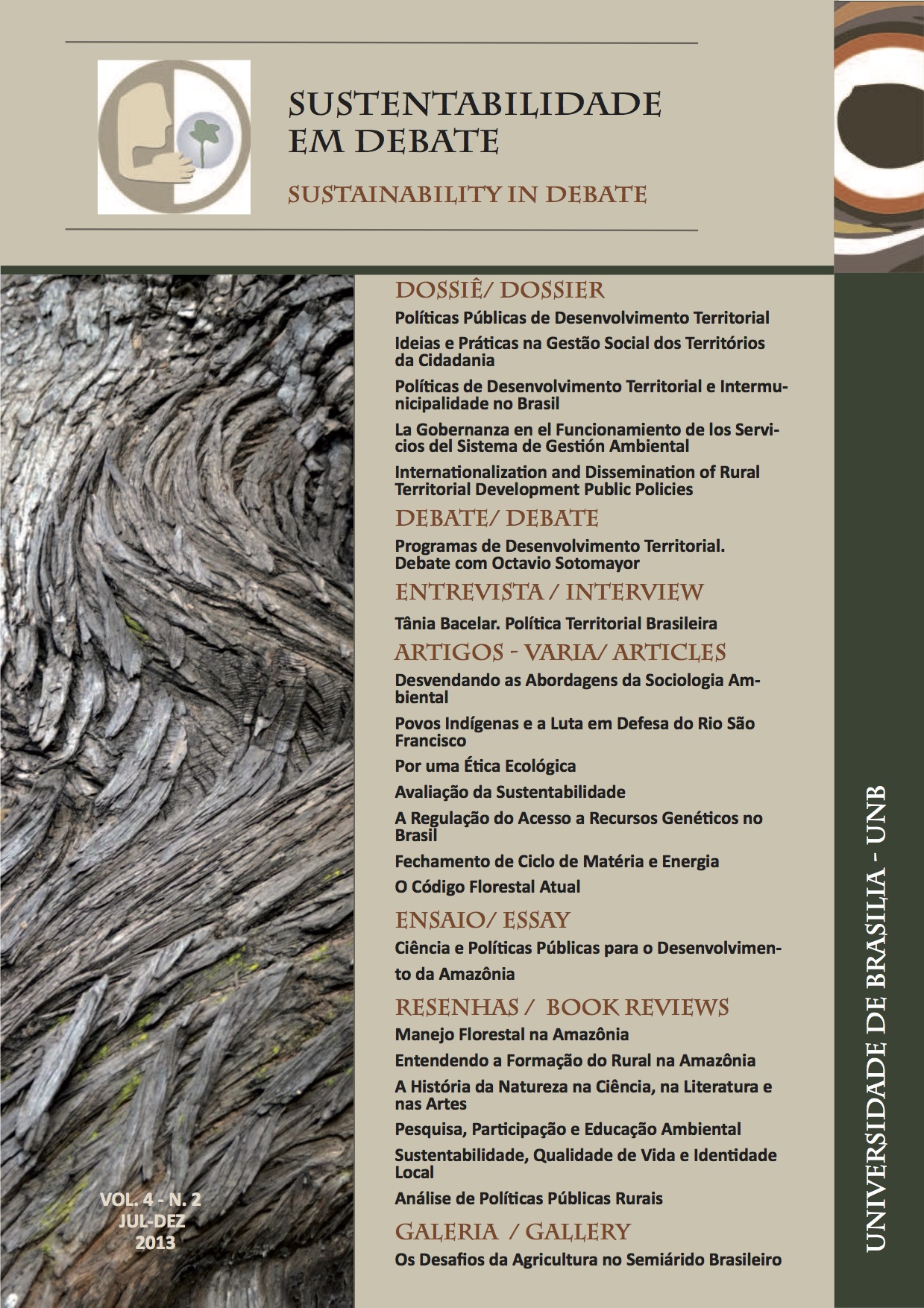Fechamento de ciclo de matéria e energia no setor sucroalcooleiro
DOI :
https://doi.org/10.18472/SustDeb.v4n2.2013.9379Mots-clés :
Simbiose Industrial, Complexo sucroalcooleiro, Ecologia Industrial, Fechamento de CicloRésumé
O desenvolvimento sustentável precisa ser encarado a partir do entendimento das múltiplas relações causais entre meio ambiente e os atores do sistema. Em sistemas agroindustriais isso urge devido à dependência entre processos de produção, qualidade dos ecossistemas, regimes climáticos e condições físico-químicas do solo. O objetivo do estudo é organizar, a partir de estudos publicados sobre o tema, os fluxos de Matéria e Energia já identificados para o setor sucroalcooleiro, apresentando um panorama geral do seu grau de fechamento de ciclo. É uma pesquisa descritiva com uso de fontes secundárias de dados e informações. Destacam-se nos resultados: i) reutilização do bagaço para cogeração de energia; ii) alta taxa de reutilização de água, que possibilita baixa captação deste insumo da base de recursos hídricos; e iii) possibilidade de tratamento da vinhaça, torta de filtro e cinzas, orientadas aos processos de fertirrigação e/ou biodigestão.
Téléchargements
Références
International Environmental Affair, v. 4, n. 1, p. 56-68, 1992.
ALVARENGA, R. P.; QUEIROZ, T. R.. Produção mais limpa e aspectos ambientais na
indústria sucroalcooleira. International Workshop Advances in Cleaner Production.
Key elements for a sustainable world: energy, water and climate change. São Paulo,
2009.
ANA; FIESP; UNICA; CTC. Manual de Conservação e reúso de água na agroindústria
sucroenergética. Brasília: ANA, 2009.
ANDREWS, C. J. Putting Industrial Ecology into place ”“ evolving roles for planners.
Journal of the American Planning Association, v. 65, n. 4, p. 364-375, 1999.
AYRES, R. U. Industrial metabolism: theory and policy. In: ALLENBY, B.R.; RICHARDS,
D. J.. The Greening of industrial ecosystems. Washington: National Academy Press,
1994.
BNDES; CGEE. Bioetanol de cana-de-açúcar: energia para o desenvolvimento
sustentável. Rio de Janeiro: BNDES, 2008.
CECHIN, A. VEIGA, J. E.. O fundamento central da Economia Ecológica. In: May, P.
(org.). Economia do Meio Ambiente. São Paulo: Editora Campus, 2009.
CETESB. A produção mais limpa (P+L) no setor sucroalcooleiro - informações gerais.
São Paulo, 2002. Disponível em: http://www.agencia.cnptia.embrapa.br. Acesso em:
25 jul. 2013.
CHERTOW, M. R.. Industrial Symbiosis: Literature and taxonomy. Annu. Rev. Energy
Environ., v. 25, n.1, p. 313”“337, 2000.
CHERTOW, M. R.. Industrial symbiosis. Encyclopedia of Energy. v. 3, n. 1, p. 407-
415, 2004.
CHERTOW, M. R.. “Uncovering” industrial symbiosis. Journal of Industrial Ecology,
v. 11, n. 1, p. 11-30, 2007.
COHEN-ROSENTHAL. What is eco-industrial development?. 2003. Disponível em:
<www.greenleaf-publishing.com>. Acesso em: 15 jul. 2013.
CONAB. Geração Termoelétrica com a Queima do Bagaço de Cana-de-Açúcar no
Brasil: Análise do Desempenho da Safra 2009-2010. Brasília: CONAB, 2011.
Disponível em: <http://www.conab.gov.br>. Acesso em: 25 jul. 2013.
DESPEISSE, M.; BALL, P. D.; EVANS, S.; LEVERS, A.. Industrial Ecology at factory level
”“ a conceptual model. Journal of Cleaner Production, v. 31, p.30-39, 2012.
EGRI, C.P.; PINFIELD, L.T.. As organizações e a biosfera: ecologia e meio ambiente.
In: CLEGG, S. T.; NORD, W. R; HARDY, C. Handbook de Estudos Organizacionais. São
Paulo: Atlas, 2001.
FROSCH, R. A.; GALLOPOULOS, N. E.. Strategies for manufacturing. Scientific
American. n.261, p. 144-152, 1989.
GEORGESCU-ROEGEN, N.. The entropy law and the economic process. Londres:
Harvard University Press, 1971.
GRAEDEL, T. Industrial Ecology: definition and implementation. In SOCOLOW, R. et
al. Industrial Ecology and global change. 1994.
JELINSKI, L.W.; GRAEDEL, T.E.; LAUDISE, R. A.; MCDALL, D.W.; PATTEL, C. K. N.
Industrial ecology: concepts and approaches. Proceeding of the National Academy
of Sciences of the United States of America. v. 89., p. 793-797, 1992.
KORHONEN, J.. Four ecosystem principles for an industrial ecosystem. Journal of
Cleaner Production. v. 9, n. 3 p. 253-259, 2001a.
KORHONEN, J.. Co-production of heat and power: an anchor tenant of a regional
industrial ecosystem. Journal of Cleaner Production. v. 9., n. 6, p. 509-517, 2001b.
KRONES, J.. The best of both worlds: a beginner’s guide to industrial ecology. 2007.
LIFSET, R.; GRAEDEL, T. E.. Industrial Ecology: goals and definitions. In: A handbook
of industrial ecology. 2002. Disponível em: http://planet.botany.uwc.ac.za. Acesso
em: 11 jul. 2013.
NEVES, M. F.; CONEJERO, M. A.. Estratégias para a cana no Brasil: um negócio classe
mundial. São Paulo: Atlas, 2010.
SOUZA, E.L.; MACEDO, I.C. (coord.). Etanol e bioeletricidade: A cana-de-açúcar no
futuro da matriz energética. União da Indústria de Cana-de-Açúcar (UNICA). 2009.
Téléchargements
Publié-e
Comment citer
Numéro
Rubrique
Licence
SUSTAINABILITY IN DEBATE – Copyright Statement
The submission of original scientific work(s) by the authors, as the copyright holders of the text(s) sent to the journal, under the terms of Law 9.610/98, implies in the concession of copyrights of printed and/or digital publication to the Sustainability in Debate Journal of the article(s) approved for publication purposes, in a single issue of the journal. Furthermore, approved scientific work(s) will be released without any charge, or any kind of copyright reimbursement, through the journal’s website, for reading, printing and/or downloading of the text file, from the date of acceptance for publication purposes. Therefore, the authors, when submitting the article (s) to the journal, and gratuitous assignment of copyrights related to the submitted scientific work, are fully aware that they will not be remunerated for the publication of the article(s) in the journal.
The Sustainability in Debate Journal is licensed under Creative Commons License – Non-Commercial-No-Derivation Attribution (Derivative Work Ban) 3.0 Brazil, aiming at dissemination of scientific knowledge, as indicated on the journal's website, which allows the text to be shared, and be recognized in regards to its authorship and original publication in this journal.
Authors are allowed to sign additional contracts separately, for non-exclusive distribution of the works published in the Sustainability in Debate Journal (for example, in a book chapter), provided that it is expressed the texts were originally published in this journal. Authors are allowed and encouraged to publish and distribute their text online, following publication in Sustainability in Debate (e.g. in institutional repositories or their personal pages). The authors expressly agree to the terms of this Copyright Statement, which will be applied following the submission and publishing by this journal.






